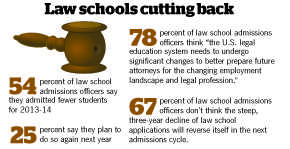Law schools around the country are reducing their incoming class sizes in an effort to combat a lagging economy and better prepare students to enter the workforce.
A recent Kaplan Test Prep survey of law school admissions officers revealed that the number of law school applicants is declining while law schools are reducing their class sizes. Northwestern School of Law reduced its incoming class of 2013 by about two dozen students, a reduction of 10 percent from the previous year.
The survey was conducted earlier this year and gathered data from 127 American Bar Association-approved law schools, some of which ranked in the top 25 schools.
Jeff Thomas, Kaplan Test Prep’s director of pre-law programs, said though law has traditionally been thought of as a reliable path to white-collar success, students graduating law schools since the 2008 economic recession have found that may not be the case.
“Historically speaking, we saw a lot of students apply to law school in times of economic turmoil,” Thomas said. “When you graduate college, you decide to enter either the workforce or school. We see a lot of students go right to the workforce and start their career path.”
Fifty-four percent of law school admissions officers reported the reduction of entering classes for 2013-14, continuing a declining trend that began two years ago, and 25 percent plan to continue the cuts in the next year.
The reduction of class sizes allows law schools to focus on each individual student in preparing them for the workplace and offering more scholarships. Thomas said law firms are not as willing to hire recent college graduates due to their lack of experience. In order to respond to these changing statistics and combat unemployment after graduation for future law students, law schools are adding more real-world training into their curriculum. Seventy-one percent of law schools reported introducing these additions, which include clinical courses, internships and externships.
NU’s law school offers hands-on, experiential learning in the public and private sectors for a semester or more through its Bluhm Legal Clinic. The school was also the first in the nation to offer an accelerated JD-MBA program, which accepts 20-40 students each year and mandates the same amount of coursework as the traditional 3-year JD program, requiring students to take classes through the first summer and work through the second summer.
“Northwestern Law has a strong track record as a place that consistently innovates based on feedback from the marketplace and with an eye on maximizing our graduates’ career readiness and success,” spokeswoman Hilary Hurd Anyaso said.
Andrea Tovar, a Weinberg senior who will apply to law school following a gap year, said she is not surprised that fewer students are pursuing law school as a postgraduate path but thinks it is not necessarily indicative of shrinking interest in the field.
“Prelaw students at Northwestern are very passionate about the law and legal issues affecting our society,” Tovar said. “At this point in time very few of them seem to be applying to law school because of the money involved in the profession.”
Email: elizabethkim2017@u.northwestern.edu
Twitter: @ehak95




















